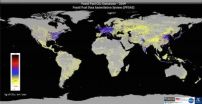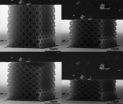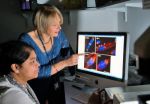(Press-News.org) Ann Arbor, Mich. — Primary care providers report many challenges to integrating genetics services into routine primary care, according to research published today in Genetics in Medicine.
Medical genetics medicine has traditionally been used to identify and diagnose rare diseases, but in the last decade it has been increasingly helpful in determining patients at risk for genetically-based conditions who can benefit from preventive health care, says the study's senior author, Beth Tarini, M.D., M.S., F.A.A.P., assistant professor of pediatrics at the University of Michigan Medical School and C.S. Mott Children's Hospital.
"Genetics is not just about rare diseases and specialists. PCPs rely on genetics frequently during preventive care visits – especially when taking family histories and assessing a patient's risk of more common, but chronic, diseases. So the fact that PCPs report many barriers to embracing and performing these tasks is concerning, " says Tarini, who is also an investigator at U-M's Child Health Evaluation & Research (CHEAR) Unit and co-medical director of the Genetics in Primary Care Institute (GPCI), a project of the American Academy of Pediatrics
Tarini and her co-investigators conducted a systematic literature review to assess reported barriers from primary care physicians across multiple practice settings, including pediatrics, family medicine, and obstetrics-gynecology.
Primary care physicians most frequently reported that their knowledge and competence related to genetic medicine is insufficient, according to the study.
Other barriers mentioned most often included a lack of knowledge about genetic risk assessment, concern for patient anxiety, a lack of access to genetics, and a lack of time.
"Shedding light on remaining challenges and misperceptions that physicians continue to experience related to genetic medicine in the primary care setting can provide opportunities for intervention in order to improve the delivery of care," says the study's lead author Natalie A. Mikat-Stevens, M.P.H., project manager for the Genetics in Primary Care Institute at the American Academy of Pediatrics.
Tarini says it is not surprising that primary care physicians cite lack of knowledge most frequently.
"Advances in genetic technology and the discovery of new genetic mechanisms seem to occur almost daily. A PCP's genetics training may be decades old and rusty from lack of use," says Tarini, who is also a member of U-M's Institute for Healthcare Policy and Innovation. "Genetics has historically been viewed as a discipline focused on rare conditions, but recent genomic advances have highlighted that genetics has a role in common conditions encountered in primary care medicine."
Tarini and her co-authors urge that efforts are focused on helping primary care physicians address and overcome these barriers.
Tarini says physicians can be helped by the promotion of practical guidelines, point-of-care risk assessment tools, tailored educational tools, and other systems-level strategies.
INFORMATION:
Journal citation: doi:10.1038/gim.2014.101
Additional author: Ingrid A. Larson of The Children's Mercy Hospitals and Clinics, Kansas City, Missouri.
Disclosure: None
About the University of Michigan's C.S. Mott Children's Hospital: Since 1903, the University of Michigan has led the way in providing comprehensive, specialized health care for children. From leading-edge heart surgery that's performed in the womb to complete emergency care that's there when you need it, families from all over come to the U-M C.S. Mott Children's Hospital for our pediatric expertise.
For more information, go to http://www.mottchildren.org
Primary care doctors reluctant to provide genetics assessment in routine care
Physicians report many barriers keep them from giving patients guidance on genetic risks, disease, according to new research
2014-09-11
ELSE PRESS RELEASES FROM THIS DATE:
Penn medicine study reveals profile of patients most likely to delay hospice enrollment
2014-09-11
One in six cancer patients enroll in hospice only during their last three days of life, according to a new study from a team from the Perelman School of Medicine at the University of Pennsylvania. Their findings, published online last month in the Journal of Clinical Oncology (JCO) also reveal a profile of patients who may be most at risk of these late admissions.
"Waiting until the final days of life to begin hospice can shortchange patients and their families – skipping over many benefits of hospice care and limiting the opportunity to improve patients' quality of ...
Study maps 15 years of carbon dioxide emissions on Earth
2014-09-11
TEMPE, Ariz. – World leaders face multiple barriers in their efforts to reach agreement on greenhouse gas emission policies. And, according to Arizona State University researchers, without globally consistent, independent emissions assessments, climate agreements will remain burdened by errors, self-reporting, and the inability to verify emissions progress.
Now, an international research team led by ASU scientists has developed a new approach to estimate CO2 emissions from burning fossil fuels — one that provides crucial information to policymakers. Called the "Fossil ...
Dartmouth research links genetic mutation and melanoma progression
2014-09-11
Dartmouth researchers have found that the genetic mutation BRAFV600E, frequently found in metastatic melanoma, not only secretes a protein that promotes the growth of melanoma tumor cells, but can also modify the network of normal cells around the tumor to support the disease's progression. Targeting this mutation with Vemurafenib reduces this interaction, and suggests possible new treatment options for melanoma therapy. They report on their findings in "BRAFV600E melanoma cells secrete factors that activate stromal fibroblasts and enhance tumourigenicity," which was recently ...
Ceramics don't have to be brittle
2014-09-11
Imagine a balloon that could float without using any lighter-than-air gas. Instead, it could simply have all of its air sucked out while maintaining its filled shape. Such a vacuum balloon, which could help ease the world's current shortage of helium, can only be made if a new material existed that was strong enough to sustain the pressure generated by forcing out all that air while still being lightweight and flexible.
Caltech materials scientist Julia Greer and her colleagues are on the path to developing such a material and many others that possess unheard-of combinations ...
Scientists report first semiaquatic dinosaur, Spinosaurus
2014-09-11
WASHINGTON (Sept. 11, 2014)—Scientists today unveiled what appears to be the first truly semiaquatic dinosaur, Spinosaurus aegyptiacus. New fossils of the massive Cretaceous-era predator reveal it adapted to life in the water some 95 million years ago, providing the most compelling evidence to date of a dinosaur able to live and hunt in an aquatic environment. The fossils also indicate that Spinosaurus was the largest known predatory dinosaur to roam the Earth, measuring more than 9 feet longer than the world's largest Tyrannosaurus rex specimen. These findings, published ...
Malaria parasites sense and react to mosquito presence to increase transmission
2014-09-11
Many pathogens are transmitted by insect bites. The abundance of vectors (as the transmitting insects are called) depends on seasonal and other environmental fluctuations. An article published on September 11thin PLOS Pathogens demonstrates that Plasmodium parasites react to mosquitoes biting their hosts, and that the parasite responses increase transmission to the mosquito vector.
Sylvain Gandon, from the CNRS in Montpellier, France, and colleagues first studied the theoretical evolution of parasite evolution in a variable environment. Using a mathematical model, they ...
Evolutionary tools improve prospects for sustainable development
2014-09-11
Solving societal challenges in food security, emerging diseases and biodiversity loss will require evolutionary thinking in order to be effective in the long run. Inattention to this will only lead to greater challenges such as short-lived medicines and agricultural treatments, problems that may ultimately hinder sustainable development, argues a new study published online today in Science Express, led by University of California, Davis and the Center for Macroecology, Evolution and Climate at the University of Copenhagen.
For the first time, scientists have reviewed ...
Dartmouth study may shed light on molecular mechanisms of birth defects among older women
2014-09-11
Dartmouth researchers studying cell division in fruit flies have discovered a pathway that may improve understanding of molecular mistakes that cause older women to have babies with Down syndrome.
The study shows for the first time that new protein linkages occur in immature egg cells after DNA replication and that these replacement linkages are essential for these cells to maintain meiotic cohesion for long periods.
The study appears in the journal PLOS Genetics. A PDF is available on request.
As women age, so do their eggs and during a woman's thirties, the chance ...
The sound of an atom has been captured
2014-09-11
Researchers at Chalmers University of Technology are first to show the use of sound to communicate with an artificial atom. They can thereby demonstrate phenomena from quantum physics with sound taking on the role of light. The results will be published in the journal Science.
The interaction between atoms and light is well known and has been studied extensively in the field of quantum optics. However, to achieve the same kind of interaction with sound waves has been a more challenging undertaking. The Chalmers researchers have now succeeded in making acoustic waves couple ...
New genetic targets discovered in fight against muscle-wasting disease
2014-09-11
Scientists have pinpointed for the first time the genetic cause in some people of an incurable muscle-wasting disease, Emery-Dreifuss muscular dystrophy (EDMD).
The international research team led by the University of Leicester say the finding of two target genes opens the possibility of developing drugs to tackle the disease in these patients. Their work has been published today in the journal PLOS Genetics.
The research was funded by The Wellcome Trust and was only possible by the University of Leicester team collaborating with groups in Germany (University of Greifswald), ...
LAST 30 PRESS RELEASES:
$3 million NIH grant funds national study of Medicare Advantage’s benefit expansion into social supports
Amplified Sciences achieves CAP accreditation for cutting-edge diagnostic lab
Fred Hutch announces 12 recipients of the annual Harold M. Weintraub Graduate Student Award
Native forest litter helps rebuild soil life in post-mining landscapes
Mountain soils in arid regions may emit more greenhouse gas as climate shifts, new study finds
Pairing biochar with other soil amendments could unlock stronger gains in soil health
Why do we get a skip in our step when we’re happy? Thank dopamine
UC Irvine scientists uncover cellular mechanism behind muscle repair
Platform to map living brain noninvasively takes next big step
Stress-testing the Cascadia Subduction Zone reveals variability that could impact how earthquakes spread
We may be underestimating the true carbon cost of northern wildfires
Blood test predicts which bladder cancer patients may safely skip surgery
Kennesaw State's Vijay Anand honored as National Academy of Inventors Senior Member
Recovery from whaling reveals the role of age in Humpback reproduction
Can the canny tick help prevent disease like MS and cancer?
Newcomer children show lower rates of emergency department use for non‑urgent conditions, study finds
Cognitive and neuropsychiatric function in former American football players
From trash to climate tech: rubber gloves find new life as carbon capturers materials
A step towards needed treatments for hantaviruses in new molecular map
Boys are more motivated, while girls are more compassionate?
Study identifies opposing roles for IL6 and IL6R in long-term mortality
AI accurately spots medical disorder from privacy-conscious hand images
Transient Pauli blocking for broadband ultrafast optical switching
Political polarization can spur CO2 emissions, stymie climate action
Researchers develop new strategy for improving inverted perovskite solar cells
Yes! The role of YAP and CTGF as potential therapeutic targets for preventing severe liver disease
Pancreatic cancer may begin hiding from the immune system earlier than we thought
Robotic wing inspired by nature delivers leap in underwater stability
A clinical reveals that aniridia causes a progressive loss of corneal sensitivity
Fossil amber reveals the secret lives of Cretaceous ants
[Press-News.org] Primary care doctors reluctant to provide genetics assessment in routine carePhysicians report many barriers keep them from giving patients guidance on genetic risks, disease, according to new research





